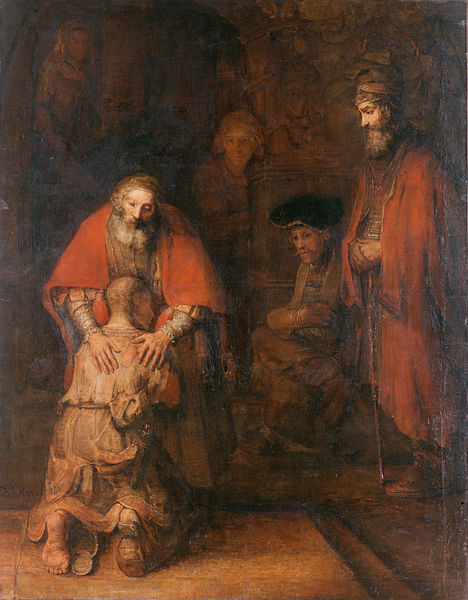Dear Brothers and Sisters,

Wanting to give her only the best, I took Tammy to Burger King for lunch (“Be Your Way”), then to Dairy Queen for dessert (“Something Different”). You’d think I’d be embarrassed by this tacky use of corporate slogans, but as McDonalds says, “I’m Lovin’ It.” And now I must beg your forgiveness (and Tammy’s!). But kidding aside, forgiveness is a key in building and maintaining relationships that are long-lasting and life-giving. This is true in relationships between leaders and followers, husbands and wives, and parents and children—human relationships of all kinds.
Forgiveness is also a vital component in the relationship that God has with us. God, being love, has covered humanity with a blanket of forgiveness, which he has extended to us unconditionally (meaning that this forgiveness is unmerited and unearned by us). As we, by the Spirit, embrace and live into that forgiveness, we understand more and more how magnificent and glorious God’s love, exhibited in his forgiveness, truly is. In meditating on God’s love for humankind, David wrote this: “When I consider your heavens, the work of your fingers, the moon and the stars, which you have set in place, what is mankind that you are mindful of them, human beings that you care for them?” (Psalm 8:3-4). I too marvel when considering the great power and lavish generosity of God in creating and upholding our immense universe, which includes a world he knew would require the death of his Son on behalf of seemingly insignificant and certainly sinful creatures like you and me.

(public domain via Wikimedia Commons)
In Galatians 2:20, the apostle Paul rejoiced that Jesus Christ, in love, gave himself for us. Yet this glorious truth of the gospel often is drowned out by the “noise” of our fast-paced world. If we’re not careful, we can fail to pay attention to what Scripture says about God’s love, exhibited in his lavish forgiveness. One of the most powerful lessons about God’s forgiving love and grace in the Bible is Jesus’ Parable of the Prodigal Son. Theologian Henry Nouwen said he learned much about it by carefully studying Rembrandt’s painting, The Return of the Prodigal Son (see above), which portrays the remorse from the wayward son, the unjustified darkness of jealousy from the resentful brother, and the inescapable loving forgiveness from the father who represents God.

Another profound example of God’s forgiving love is the enacted parable recounted in the book of Hosea. Lived out through the prophet Hosea’s own experience, the parable illustrates God’s unconditional love and lavish forgiveness for wayward Israel as a powerful illustration of the forgiveness that he extends to all people.
God told Hosea to marry a prostitute named Gomer. Some believe this means he was to take a wife from the spiritually adulterous northern kingdom of Israel. In any case, it was not the kind of marriage anyone would want, as Gomer repeatedly left Hosea to have a life of prostitution. At one point Hosea buys Gomer back from presumed slave traders, yet she continued to run off with lovers who promised her material gain. “I will go after my lovers,” she said, “who give me my food and my water, my wool and my linen, my olive oil and my drink” (Hosea 2:5). Regardless of Hosea’s attempts to stop her, Gomer continued seeking companions in sin.
We cannot help but be moved by what Hosea did in taking his wayward wife back time and again—extending to her loving, unconditional forgiveness. Perhaps Gomer tried at times to make things right, but if that was the case, her repentance was short-lived. She was soon back to her adulterous ways, chasing after other lovers.
Hosea’s loving and forgiving treatment of Gomer illustrates God’s response of faithfulness to us even when we are unfaithful to him. This unconditional forgiveness is based not on how we respond, but on who God is. Like Gomer thinking she would find freedom by entering new forms of slavery, we forsake God’s love by trying to do things our own way. At one point Hosea had to pay for Gomer’s freedom with material possessions. God, who is love, paid a much higher price for our freedom—he gave his beloved Son Jesus as a “ransom for all people” (1 Timothy 2:6). God’s indestructible, never-failing, never-ending love “bears all things, believes all things, hopes all things, endures all things” (1 Cor. 13:7 NKJV). It also forgives all things, for love “keeps no record of wrongs” (1 Cor. 13:5 NIV).
Some who read Hosea’s story might contend that to keep on forgiving without repentance affirms the offender in their sin—it amounts to approving the behavior of the sinner. Others might contend that if you keep on forgiving, you will cause the offender to think they can get away with anything they want. But receiving freely-given forgiveness necessarily involves admitting that one needs that forgiveness—and that is true no matter how many times the forgiveness is extended. The one who presumes upon God’s forgiveness, using it to justify repeated offences, does not receive that forgiveness at all, for they have not acknowledged their need for forgiveness.
Presumption upon forgiveness, means rejecting rather than receiving God’s grace. Such presumption never yields a joyful, reconciled relationship with God. Nevertheless, such rejection does not cause God to withdraw his offer of forgiveness. God’s offer of forgiveness in Christ to all people is unconditioned by anything we are or anything we do.
Those who have embraced God’s unconditional forgiveness (as did the prodigal son), do not presume on that forgiveness. Knowing that they have been unconditionally forgiven, their response, rather than presumption or rejection, is one of relief and gratitude that yields a desire to reciprocate with kindness and love. When we receive forgiveness, our minds are released from the bondage that so easily builds walls between us, and we experience the freedom to grow in relationship with each other. The same is true when we unconditionally extend forgiveness to those who have offended us.
Why would we want to unconditionally forgive those who had offended us? Because that is how God, in Christ, has forgiven us. Note Paul’s statements:
Be kind and compassionate to one another, forgiving each other, just as in Christ God forgave you. (Ephesians 4:32)
As God’s chosen people, holy and dearly loved, clothe yourselves with compassion, kindness, humility, gentleness and patience. Bear with each other and forgive one another if any of you has a grievance against someone. Forgive as the Lord forgave you. And over all these virtues put on love, which binds them all together in perfect unity. (Colossians 3:12-14)
When we receive and rejoice in the unconditional forgiveness God has extended to us in Christ, we can truly value the blessing of extending life-giving, relationship-building, unconditional forgiveness to others in the name of Christ.
Rejoicing in the way forgiveness has blessed my relationships,
Joseph Tkach



What a powerful little article. Forgiveness seems to keep popping up regularly in conversation, reading and in social media. I’ve been ‘prompted’ to make a few posts on Facebook about this lately and have found it keeps coming up in my sermon texts too. When the Spirit speaks, the wise listen. I know I have been forgiven much, and can’t bear the thought of living with the shackles of being unforgiving.
Thanks for sharing.
“To be a Christian means to forgive the inexcusable because God has forgiven the inexcusable in you.”
-C.S. Lewis
The wonderful truth of our forgiveness is a reality that produces gratitude every day. Forget this reality and judgmentalism rears it’s ugly head so quickly. Thank you so much for this insightful article.
Hi Joe, that’s an excellent article. However, some of our politicians appear to have difficulty with the whole concept…